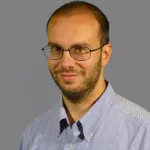Observers dubbed it the Vatican’s “Trial of the Century.” Cardinal Angelo Becciu and nine others are accused of alleged embezzlement of Vatican funds. This past July, the Vatican City’s promoter of justice asked judges to sentence Cardinal Becciu to more than 7 years in prison.
This is a landmark case at the Vatican because the last time the Church tried a Cardinal for financial crimes was in the 1730s. Edward Pentin, Senior Correspondent with EWTN’s National Catholic Register, has been following the story closely.
He explains, “This is really the first time that there's been such a major trial regarding the Vatican finances. A trial in the Vatican with Vatican prosecutors. The key person in this trial of course is Cardinal Angelo Becciu, the former sostituto, the deputy Secretary of State. He is the first Cardinal to be tried by lay judges. Cardinals could be tried in the past but they had to be tried by other cardinals. Obviously upon permission of the Pope. But this is the first time that lay prosecutors can bring a cardinal to trial.”
According to the official charge sheet, the Cardinal is accused of embezzlement and abuse of office, conspiracy, as well as witness tampering. He is one of ten people, including prelates, financiers, and high-ranking Vatican officials, as part of an investigation over the purchase of a luxury building in London at 60 Sloane Avenue.
While the focus of the trial centers on the London deal, the charges and evidence span years preceding its conclusion. The investigation, triggered by the 2018 acquisition of the building by the secretariat, has led to the current trial.
Andrea Gagliarducci is a Vatican Analyst for EWTN News and has been watching the recent developments in the trial. Regarding the important hearing on November 22, wherein the lawyers of Cardinal Becciu spoke, Gagliarducci notes, “The two keys in my view, Financial Intelligence Authority and Cardinal Becciu, for too many reasons. Because the Financial Intelligence Authority worked along the Secretary of State in order also to fix the investments and to help the Holy See, to recover money or to recover an investment that was a good investment, in my view. But it was poorly managed. Mostly Cardinal Becciu is implied very much just in a small part of the trial, because for what concerns the London real estate, he just gave the initial OK, but then he was not sostituto anymore.”
Cardinal Becciu has insisted that he had nothing to do with the purchase of the London building, and it was managed by his successor, Archbishop Edgar Peña Parra.
The acquisition of the London property, causing a loss of over 100 million euros for the Vatican, was a component of a settlement as the secretariat disentangled itself from financier Raffaele Mincione. The secretariat had previously invested around 200 million euros with Mincione in 2014.
Cardinal Becciu approved the initial investment, its financing, and the unconventional recording on Vatican balance sheets, all forming part of the prosecution's case. Before the trial, Becciu resisted scrutiny when the Secretariat for the Economy and the Office of the Auditor General sought to audit the Secretariat of State’s books for a curia-wide audit in 2015-2016.
Reports, later confirmed by Cardinal George Pell and Auditor General Libero Milone, reveal that under Becciu's leadership, the secretariat employed forbidden accounting practices to conceal the entire 200 million euro investment with Mincione and the associated bank loans from auditors.
Looking ahead, it is not clear what the outcome will be because of the nature of the Vatican Tribunal. Gagliarducci notes, “The Vatican City State has a strange system where the Pope is at the top of everything. So, at one point the Pope could also ask to have an indictment or a guilty plea, even if there are no evidences because the Pope wants to give example. It will tell a lot about how the Pope is governing church and how the Pope is considering himself. No pope so far in this last century intervened so much in the micromanagement like Pope Francis.”
As the trial progresses, concluding with a verdict expected in mid-December, Becciu's legal team aims to address the presented evidence.

Andrea Gagliarducci is an Italian journalist for Catholic News Agency and Vatican analyst for ACI Stampa. He is a contributor to the National Catholic Register.








